|
|
|
Sort Order |
|
|
|
Items / Page
|
|
|
|
|
|
|
| Srl | Item |
| 1 |
ID:
076915
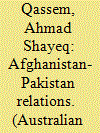

|
|
|
|
|
| Publication |
2007.
|
| Summary/Abstract |
When the Taliban regime was overthrown in Afghanistan in late 2001, there was much optimism that, with the anticipated and unprecedented economic, political and military engagement of the international community with Afghanistan, the country would become stable. However, resurgent violence indicates that this is not happening. An important reason for the continuing instability lies in the fact that the international effort has failed to address longstanding disagreements between Afghanistan and Pakistan - the Durand Line border dispute and the Pushtunistan issue - which in turn impairs the two countries' cooperative capacity in the anti-Taliban campaign. Resolution of these disputes would go a long way to help the situation. This article analyses the dynamics of the border dispute, the Pushtunistan issue and the Taliban insurgency as an outgrowth of longstanding historical disputes between Afghanistan and Pakistan
|
|
|
|
|
|
|
|
|
|
|
|
|
|
|
|
| 2 |
ID:
076919
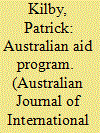

|
|
|
|
|
| Publication |
2007.
|
| Summary/Abstract |
The Australian government's White Paper on aid provides a blue print for the Australian aid program for the next decade. While it ostensibly has a focus on poverty, it still sees economic growth and effective government as the path to poverty reduction. This article analyses and highlights the issues associated with this approach to poverty. These are: growing inequality and vulnerability, the rural-urban divide in poverty outcomes, and increasing social exclusion leading to increasing social and political insecurity. The article then examines the alternative policies adopted by the British aid agency, DFID, and concludes with some suggestions on how the practice of the Australian aid program can better match the goal of poverty reduction
|
|
|
|
|
|
|
|
|
|
|
|
|
|
|
|
| 3 |
ID:
076911
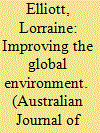

|
|
|
|
|
| Publication |
2007.
|
| Summary/Abstract |
Recent surveys in Australia show that improving the global environment rates high as a public policy concern. Responding to these challenges at a global level requires more than finding the best or most appropriate scientific, economic and technical approaches. It also requires that global environmental governance be based on sound normative principles. Two of the most important principles respond to the challenge that, while humanity is outstripping its ecological footprint, contributions to global environmental change are uneven and the experience of environmental harm is being displaced across time and space. Improving the global environment should therefore take into account the precautionary principle and the principle of common but differentiated responsibilities. Improving the global environment also requires a more robust institutional framework. The model favoured here is to build on UNEP to establish a more coherent, more authoritative and more independent environmental organization.
|
|
|
|
|
|
|
|
|
|
|
|
|
|
|
|
| 4 |
ID:
076913


|
|
|
|
|
| Publication |
2007.
|
| Summary/Abstract |
This article considers how three countries - the United States, the United Kingdom and Australia - approached the lead-up to the invasion of Iraq in 2003 by examining how the leaders' decision-making interacted, the commonalities of their policy-making processes, and the approach to policy justification taken in terms of their domestic political environments. In particular, it examines the extent to which their claims as to why invasion was necessary went in synchrony. Having decided on war, all three national leaders sought to persuade their publics of the moral imperative for invasion and the immediacy of the threat that needed to be eradicated, and each made secret intelligence public in so doing. The selective use of intelligence allowed the politial leaders to shift the focus of the blame from policy-makers to intelligence accuracy when the immediate threat from weapons of mass destruction turned out to be illusory
|
|
|
|
|
|
|
|
|
|
|
|
|
|
|
|
| 5 |
ID:
076912
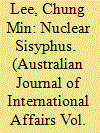

|
|
|
|
|
| Publication |
2007.
|
| Summary/Abstract |
Is North Korea ready and willing to give up its nuclear weapons? Proponents of arms control and sustained engagement with North Korea maintain that Pyongyang's desire to acquire nuclear weapons stemmed from ingrained insecurity vis-à-vis the United States or more specifically, the threat that the US poses to fundamental regime security.
However, the primordial source of Kim Jong Il's existential insecurity stems largely from the abnormal, structural idiosyncracies of his regime and not, as many naively believe, the hardline policies of the Bush administration. Accordingly, the Kim Jong Il regime's fundamental dilemma boils down to the fact that the domestic political costs of giving up its nuclear capabilities are just as high as the costs of retaining them.
Debunking the myth that the US, rather than North Korea, poses the greater challenge to South Korean security is as important as ensuring that North Korea dismantles its nuclear arsenal
|
|
|
|
|
|
|
|
|
|
|
|
|
|
|
|
| 6 |
ID:
076914


|
|
|
|
|
| Publication |
2007.
|
| Summary/Abstract |
The weapons of mass destruction (WMD) Saddam Hussein was said to possess were central to the justification the Australian Prime Minister gave for Australia's decision to go to war in Iraq. When no WMD materialised, poll data suggested that the public felt misled. But the same data suggested that support for both the government and the Prime Minister was unaffected. Among critics of the war, this generated a moral panic about Australian democracy and the Australian public - its commitment to the end justifying the means, its failure to receive a lead from the Labor Party, its widespread apathy. It also led to an intense debate about why the charge of not telling the truth had weakened public support for Blair and Bush but not for Howard. This article explores the concerns expressed by critics of the war in the face of polling that suggested that Australians were prepared to support a government and its leader that had misled them - deliberately or otherwise. It raises questions about the contrasts drawn between polled opinion in Australia, Britain and the United States. And it argues that the differences in the pattern of opinion across the three countries were not marked and that what had cost governments support were views about how the war was going, not the failure to find WMD
|
|
|
|
|
|
|
|
|
|
|
|
|
|
|
|
| 7 |
ID:
076918


|
|
|
| 8 |
ID:
076917
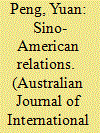

|
|
|
|
|
| Publication |
2007.
|
| Summary/Abstract |
Sino-American relations encompass a highly complex array of cooperative and competitive dimensions. Recently, they have evolved around the question of 'China's rise' or (as Chinese analysts would state it) 'peaceful evolution'. This article surveys both the cooperative and competitive structural elements of this important bilateral relationship. It tracks recent transitions in that relationship, arguing that China's new-found status as a 'responsible stakeholder' in American eyes will present a new set of American expectations and new forms of strategic collaboration that will seriously test both sides' policy creativity and ability to adapt to a rapidly changing global environment.
|
|
|
|
|
|
|
|
|
|
|
|
|
|
|
|
| 9 |
ID:
076916
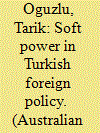

|
|
|
|
|
| Publication |
2007.
|
| Summary/Abstract |
This article examines to what extent Turkey's foreign policy identity has transformed from being a 'hard power' to a 'soft power' over the last few years. In doing so, this article also contends that there is a close relationship between the degree of securitisation of issues and whether the power used to deal with them is hard or soft in nature. If issues of concern were securitised, the tendency to use hard power would increase. Another argument is that the main difference between these two types of power stems from the kind of 'logic of action' that governs the behaviour of agents. If an instrumental logic of action were in play, meaning if the goal were to force others to make a cost-benefit analysis through coercing or coaxing strategies, then one could talk about hard power. If the goal were to ensure that others would automatically follow the lead of the power-holder due to the power of attraction the latter has in the eyes of the former, then one could refer to the existence of soft power. The main conclusion of this article is that recent internal and external developments have contributed to Turkey's soft power potential.
|
|
|
|
|
|
|
|
|
|
|
|
|
|
|
|
|
|
|
|
|